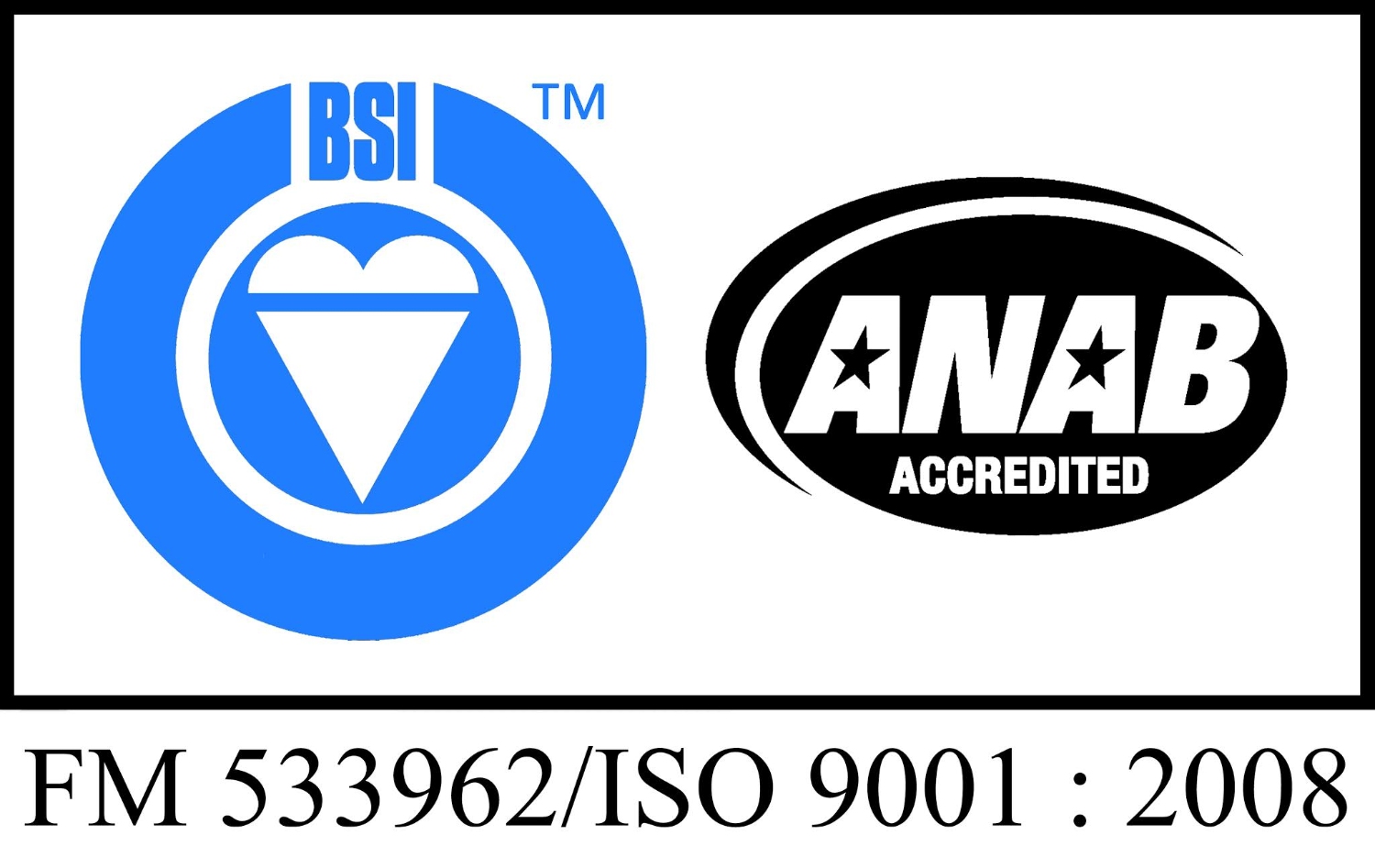Coil nails, specifically smooth shank coil nails and screw shank coil nails, are two of the most widely used fasteners in the construction and manufacturing industries. Although they have similar forms, each type of coil nail has distinct characteristics, production processes, applications, and features, serving different purposes in construction and manufacturing. This article will delve into the technical aspects, production processes, advantages, disadvantages, applications, and export potential of these two types of nails.
MỤC LỤC BÀI VIẾT
Smooth Shank Coil Nails
Raw Materials Used in Smooth Shank Coil Nails
Smooth shank coil nails are primarily made from low-carbon steel or alloy steel. Low-carbon steel is chosen for smooth shank nails because of its moderate hardness, which is enough to anchor the nails into materials without causing surface damage during installation. In addition to low-carbon steel, some premium smooth shank nails may be made from stainless steel, which increases corrosion resistance and extends the lifespan of the product, especially in outdoor or damp environments.
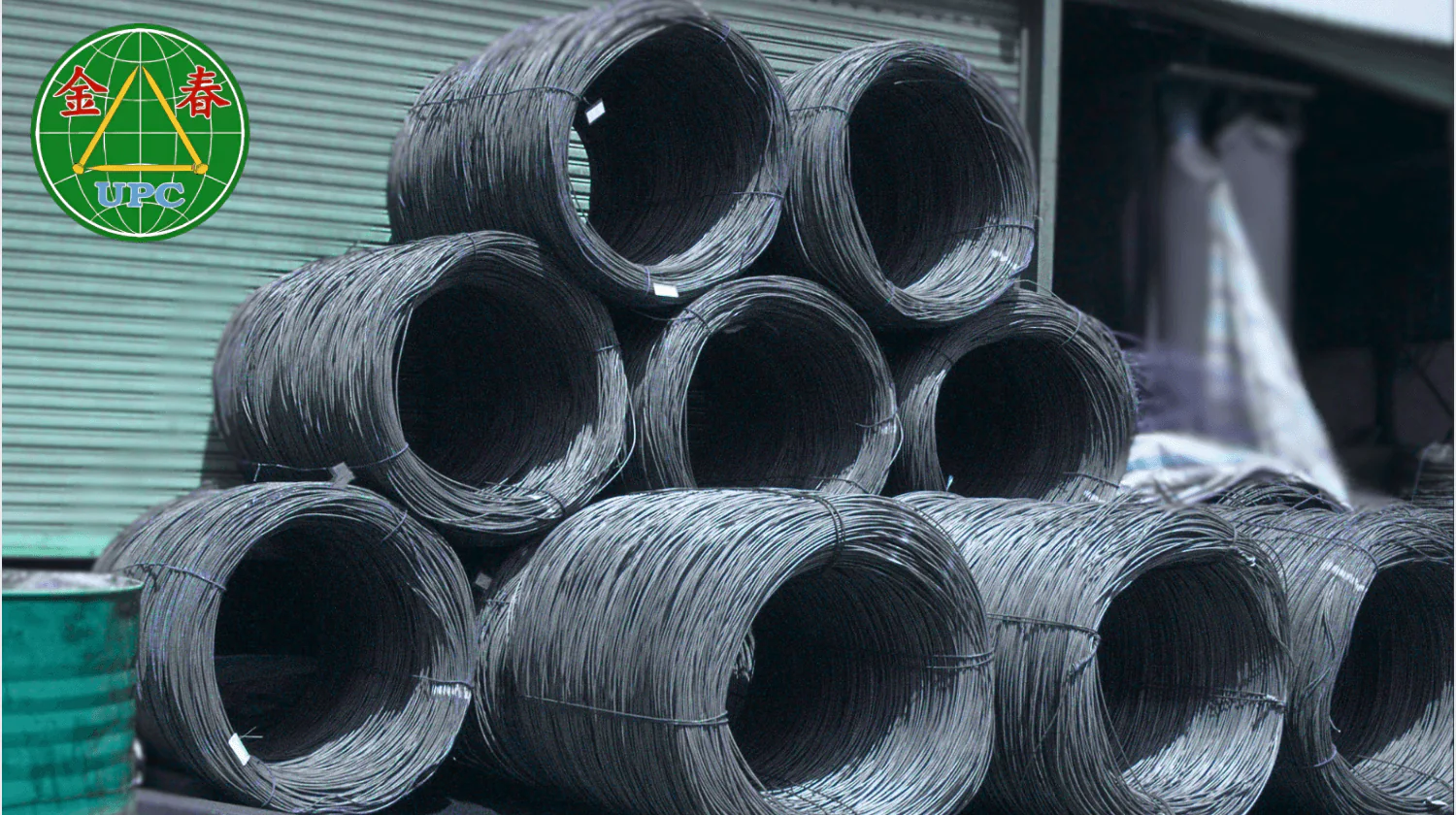
The source of raw steel materials for producing at United Nail Product Co., Ltd.
The surface of smooth shank coil nails may be galvanized or coated with a protective layer to prevent rusting and increase the product’s durability. The galvanization process typically involves immersing the nails in molten zinc, which forms a protective coating on the surface, shielding the nails from oxidation and corrosion.
Production Process of Smooth Shank Coil Nails
The production process of smooth shank coil nails involves several key stages to ensure product quality and durability:
Material preparation: Steel coils are carefully selected to meet the necessary quality standards for strength and ductility.
Cutting and elongating the steel: After the steel coils are prepared, they are cut into appropriate lengths and then elongated to achieve the required size for the final product.
Shaping the nail: The steel is then fed into a shaping machine, where it is bent into a smooth, uniform cylindrical shape, with the appropriate length.
Galvanizing or coating: After shaping, the nails may undergo a galvanization process or be coated with a protective layer to prevent corrosion. This protective coating extends the lifespan of the nails, especially in outdoor and harsh environments.
Coiling the nails: Once the nails are formed and coated, they are coiled into large rolls for convenient transportation and use on construction sites.
Advantages and Disadvantages of Smooth Shank Coil Nails
Advantages:
- Easy to use: Smooth shank nails are easy to drive into soft materials like wood and plastic without damaging the surface.
- Cost-effective: The simple production process and easily accessible materials make smooth shank nails affordable, helping to reduce overall construction costs.
- No surface damage: The smooth shaft design ensures that the nails do not scratch or damage the surface of materials, making them ideal for applications requiring a clean finish.
Disadvantages:
- Lower holding power: Smooth shank nails are not as effective at holding materials together compared to screw shank nails, especially in applications that involve higher stress or load.
- Prone to slipping: In applications where high pull-out strength is required, smooth shank nails may slip or become dislodged over time.
Applications of Smooth Shank Coil Nails
Smooth shank coil nails are primarily used in applications where the connection does not need to bear heavy loads. Some common applications include:
- Interior construction: Used extensively in woodwork and light construction, such as in wooden furniture assembly.
- Light-duty fastening: Ideal for fastening materials like softwoods, plastics, or drywall where the material will not bear heavy loads.
- Temporary fastening: Used in applications where temporary connections are needed, such as in the assembly of displays or light structures.
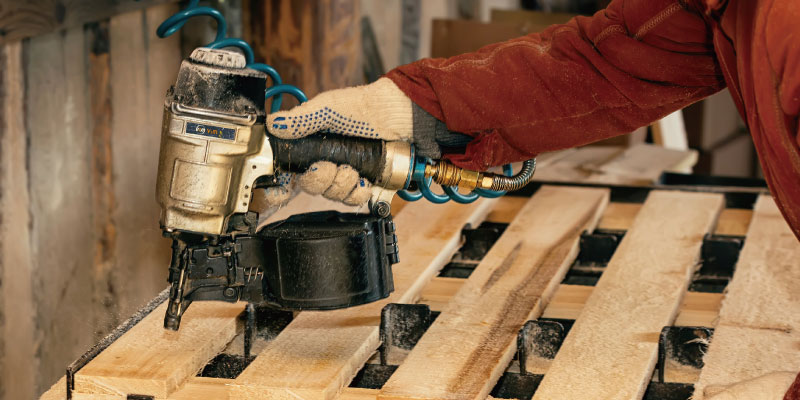
Smooth shank coil nails are typically used in woodworking and light construction
Common Sizes of Smooth Shank Coil Nails
Smooth shank coil nails come in various sizes to accommodate different applications. Common sizes include:
- Nails ranging from 25mm to 50mm: Used in light-duty construction or materials that require less depth of penetration.
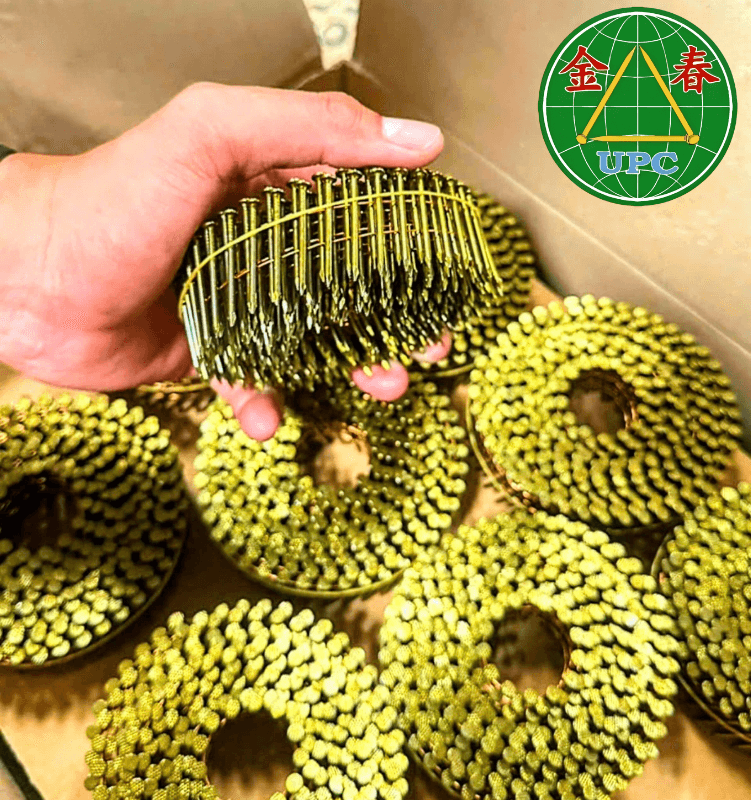
2.1mm×32mm Smooth Shank Coil Nails
- Nails ranging from 75mm to 100mm: Ideal for more robust construction or materials requiring deeper penetration.
Pricing of Smooth Shank Coil Nails
The cost of smooth shank coil nails generally ranges from $0.02 to $0.05 per nail, depending on the material and size. This makes them an affordable option for many construction projects that do not require high strength.
Global Market for Smooth Shank Coil Nails
Smooth shank coil nails are widely consumed in countries such as the United States, Germany, Japan, China, and Southeast Asian nations. These countries import smooth shank nails primarily for use in construction and furniture production.
Screw Shank Coil Nails
Raw Materials Used in Screw Shank Coil Nails
Screw shank coil nails are typically made from high-quality carbon steel or alloy steel to ensure higher tensile strength and durability. Since the screw threads along the nail’s shaft help anchor it more securely into materials, the steel needs to be strong enough to maintain the sharpness of the threads and withstand significant force. In some cases, screw shank nails are made from stainless steel for applications requiring enhanced corrosion resistance in harsh environments.
Production Process of Screw Shank Coil Nails
The production of screw shank coil nails is similar to that of smooth shank coil nails, but with an additional crucial step of creating the screw threads along the nail’s shaft:
Selecting high-quality steel: The steel is carefully selected to meet international standards for hardness and ductility.
Cutting and shaping: After cutting the steel into the appropriate lengths, the nails are shaped into a cylindrical form, similar to the smooth shank nails.
Screw threading: This is the key difference in production. A specialized machine is used to twist the nail, forming screw threads along the shaft. These threads provide a superior grip in materials like wood, metal, and concrete, ensuring a secure hold.
Galvanizing or coating: Like smooth shank nails, screw shank nails may also undergo galvanization or be coated with a protective layer to prevent rust and extend their lifespan.
Coiling the nails: After the threading process, the nails are coiled into rolls, similar to smooth shank coil nails, for ease of transport and use in construction projects.
Advantages and Disadvantages of Screw Shank Coil Nails
Advantages:
- Higher holding power: The screw threads along the shaft provide an exceptional grip in hard materials, ensuring a strong and secure fastening.
- Increased durability: Screw shank nails can withstand higher pull-out forces, making them ideal for use in heavy-duty applications.
- Prevents slipping: The screw threads help prevent the nails from becoming dislodged over time, even under stress or vibration.
Disadvantages:
- Higher cost: Due to the more complex manufacturing process and higher-quality raw materials, screw shank nails are generally more expensive than smooth shank nails.
- Not suitable for soft materials: The screw threads may cause damage or marking to soft materials like drywall or plastic, making them unsuitable for these applications.
Applications of Screw Shank Coil Nails
Screw shank coil nails are used in heavy-duty applications where a strong, long-lasting connection is required. Some common applications include:
- Heavy construction: Used extensively in infrastructure projects such as bridges, roadways, and steel structures where a secure hold is essential.
- Industrial machinery assembly: Ideal for fastening metal or thick wooden components in industrial machinery.
- Outdoor construction: Commonly used in outdoor environments where nails need to resist rust and corrosion, such as in roofing or deck construction.

For large-scale, outdoor projects, Screw shank coil nails are the preferred choice.
Common Sizes of Screw Shank Coil Nails
Screw shank coil nails are available in a variety of sizes to suit different applications. Common sizes include:
- Nails ranging from 30mm to 75mm: Suitable for medium-duty construction and fastening applications.
- Nails ranging from 75mm to 100mm: Used for heavy-duty applications, particularly in industrial and infrastructure construction.
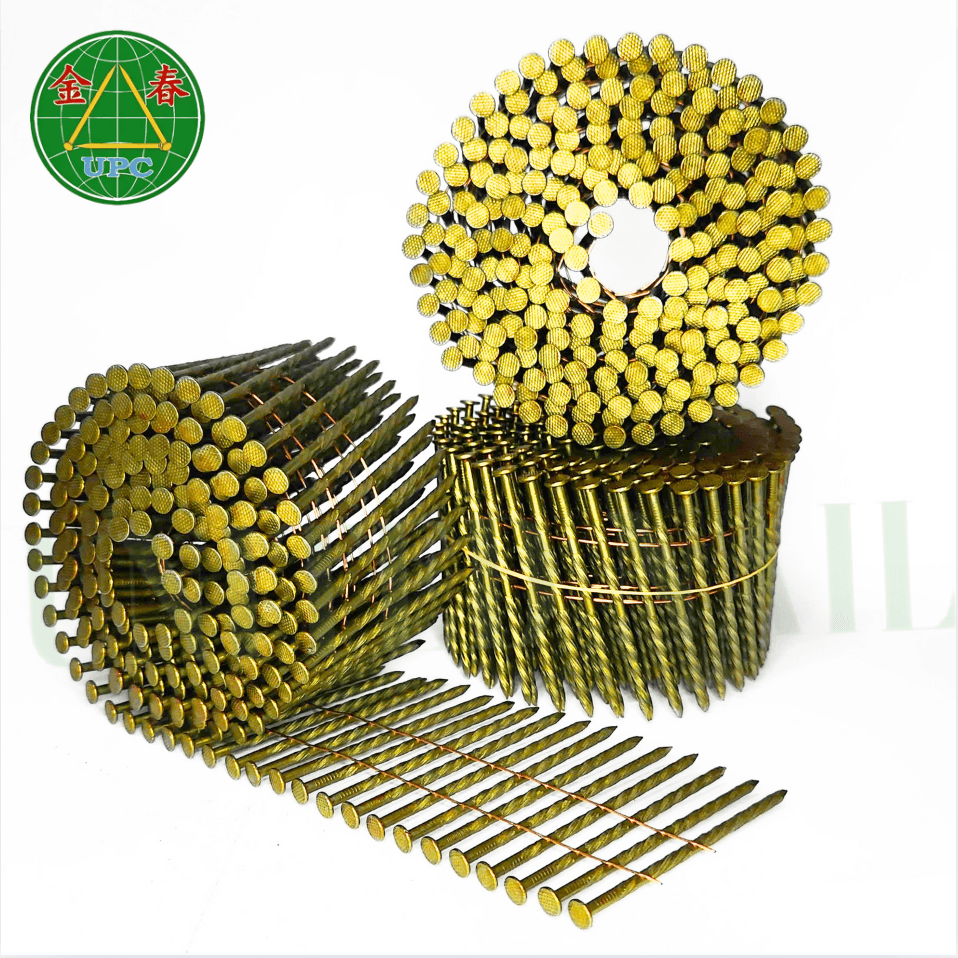
3.0x76mm Screw Shank Coil Nails
Pricing of Screw Shank Coil Nails
The cost of screw shank coil nails generally ranges from $0.05 to $0.10 per nail, depending on material quality and size. The higher cost is justified by the added durability and holding power provided by the screw threads.
Global Market for Screw Shank Coil Nails
Screw shank coil nails are primarily exported to countries with demanding construction and industrial sectors, including the United States, Japan, Canada, Australia, and several European countries.
Conclusion
Smooth shank coil nails and screw shank coil nails are two essential products in the construction and manufacturing industries. Each type of nail has distinct characteristics, production processes, and applications, making them suitable for different needs in construction. Understanding the technical features and applications of each type of nail allows contractors, engineers, and consumers to select the appropriate product for their projects, ensuring both cost-effectiveness and durability.
United Nail Products Co., Ltd. is committed to providing high-quality coil nails that meet international standards, catering to diverse customer needs across both domestic and international markets. With a team of experienced professionals, the company is ready to support clients in any project, offering the most optimal and effective solutions.
Contact Information
UNITED NAIL PRODUCTS CO., LTD
Specializing in high-quality nails and small coil wire production
Thank you for taking the time to read this article. We hope the information proves helpful to you.




